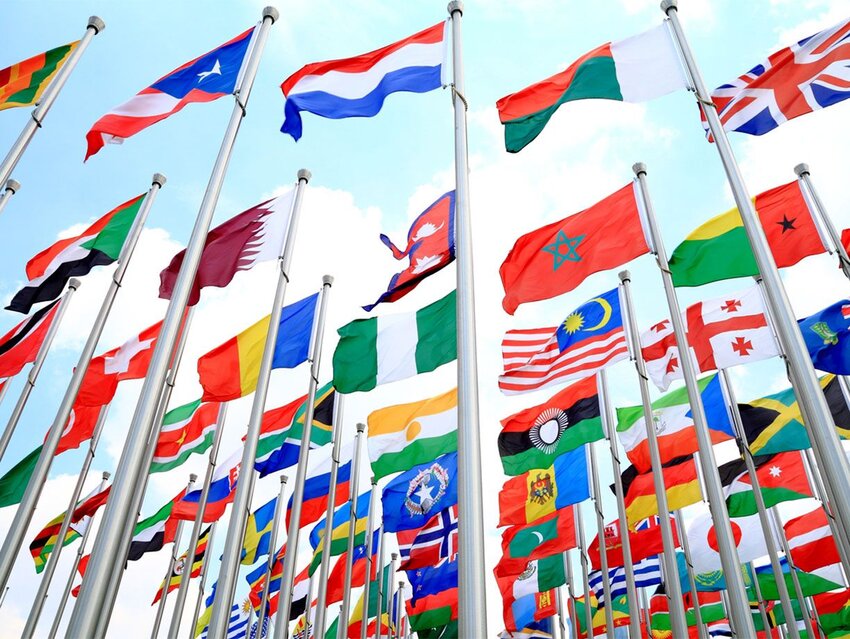A demonym is a noun used to describe the people who live in a particular country, state, city, or region. For example, the demonym for citizens of the United States of America is “American” and those from Canada are “Canadian.” The origin of “demonym” is murky, but the term was popularized by Merriam-Webster editor Paul Dickson in 1997. Its etymology points to the Greek language, combining dêmos, meaning “people,” with ónyma, meaning “name.” Not all demonyms are as clear-cut as “American” and “Canadian,” though, making it tricky to pinpoint where someone is from.
Demonym Rules
Demonyms tend to follow certain grammatical rules, usually involving a suffix, to keep things standardized. Popular suffixes include “-an,” “-ian,” “-ish,” “-ese,” “-ci,” and “-i,” and they’re usually dictated by the root language (“-ian” indicates a Latin-based language, for example). These suffixes make determining demonyms relatively easy: “America” to “American,” “Italy” to “Italian,” “Poland” to “Polish,” “Japan” to “Japanese,” “Iceland” to “Icelandic,” and “Israel” to “Israeli.” But, of course, some demonyms do not follow these rules, resulting in some very unusual words. Let’s learn more about obscure demonyms in the English language.
Liverpudlian, a Resident of Liverpool, England
King John I granted a charter for Liverpool in 1207, but the demonym “Liverpudlian” appeared in print in the 1830s, joking about the name of sports teams (replacing “pool” with “puddle”). The suffix “-ian” was added to the end of “Liverpuddle” (similar to a “Parisian” from Paris), resulting in Liverpudlian.
Phoenician, a Resident of Phoenix, Arizona
There are two types of Phoenicians: residents of an ancient civilization in the eastern Mediterranean and residents of the U.S. city of Phoenix, Arizona. The ancient civilization was called Phoenicia, derived from its earlier name, Phoinike. There is no relation between Phoenicia and the myth of the phoenix, but modern-day Phoenicians (and the city of Phoenix) gained the demonym from the bird. American settlers hoped that the new 19th-century town would “rise from the ashes,” just like the mythical creature.
Mancunian, a Resident of Manchester, England
This term stems from the medieval Latin form of Manchester, “Mancunium.” The name of the region itself has gone through various changes over the centuries, from its original Celtic name, Mamucio in the 4th century, to “Mameceastre” in 1086, eventually transforming into “Manchester.” Still, despite the name changes, the city’s residents retained their moniker “mancunians” from the Latin name.
Muscovite, a Resident of Moscow, Russia
Natives of Russia’s capital city carry the unique moniker of “Muscovites.” The name comes from the former principality “Muscovy”— also called the Grand Duchy of Moscow or Muscovite Russia — that was located in Russia in the late Middle Ages and centered around what is now Moscow.
Glaswegian, a Resident of Glasgow, Scotland
While it is the demonym for people from Glasgow, “Glaswegian” is also one of Scotland’s indigenous languages, along with English and Scottish Gaelic. This irregular demonym is formed through what historical linguist Lauren Fonteyn describes as a linguistic analogy. “Galwegians” are from Galway, Ireland, which is an analogy to how “Norwegians” are from Norway. Fonteyn suspects that since “Glasgow” and “Galway” are in similar regions and have fairly similar spellings, “Glaswegian” was adopted.
Haligonian, a Resident of Halifax, Nova Scotia or England
A Haligonian is a resident of any city named Halifax, whether it’s in Nova Scotia or England. The term has been around since at least the 19th century when the prefix “Hali-” was combined with the suffix “-onian.” The spelling (and the addition of the “g”) likely relates to “Haligonia,” the medieval Latin name of Halifax, England. This demonym works similar to “Patagonian” and "Oregonian."
Monégasque, a Resident of Monaco
The residents of this country on the French Riviera are called “Monégasques.” Monégasque is also Monaco’s native language, although French is the official language. The term “Monacans” is sometimes used because of its similarity to other demonyms, but it is incorrect.
Featured image credit: 123ArtistImages/ iStock

